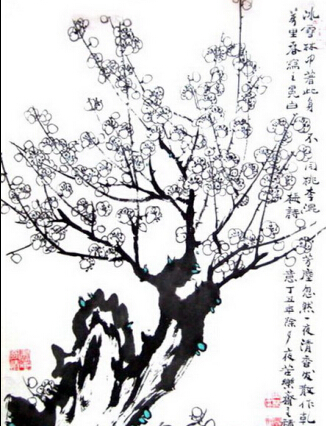Yuan poetry: conveying the concept of nature

The poem Ode to the Plum Blossom written by Wang Mian (1287-1359), one of famous poets in Yuan Dynasty
Qu, a type of poetry from the Yuan Dynasty, holds a dominant position in the history of Chinese literature, defying commonly held misconceptions that the people of the era did not read, write or comment on poetry. Through this distinctive form of poetry, the Yuan Dynasty displayed its prosperity, and literary criticism was a widespread practice among the people. Yuan poets took their craft to a higher level, leaving a lasting mark on Chinese literature.
The richness of Yuan poetry is beyond belief. Chinese poet and literary scholar Qian Qianyi (1582-1664) once elaborated in the Preface to Hu Zhiguo Poems: “Tang poetry had declined in the Song Dynasty. With the collapse of the Song Dynasty, poetry took over the literary world once again…At this moment, there is not a single poem that hasn’t changed its style and not one that has not experienced a flourish.” Qian’s commentary highlighted the ascendancy of poetry as China entered the Yuan Dynasty.
In this period, poetry commentary and appreciation became popular among Yuan intellectuals, prompting scholars to write poetry to express their inner feelings.
During the Song and Yuan dynasties, two distinguished scholars of poetry emerged — Liu Chenweng (1232- 1297) and Fang Hui (1227-1307). Although his commentary on the poems of the Tang and Song dynasties were completed during the reign of the Yuan, Liu was regarded as a Song scholar by later generations. But his contributions to Yuan literary criticism cannot be undervalued.
As a great master of Yuan poetics, Fang Hui not only accomplished the masterpiece Essences of Ying Kui Verses but also contributed Collections of Reviews on Yan Baoxie’s Poems to the circle of Yuan poetic criticism and his works contained a large amount of sophisticated commentary on poems.
The academic culture in the Yuan Dynasty holds a special place in Chinese history, and its development of poetry reflected the independent value of life and personality of Yuan scholars. In their mind, poets and poems are independent, and “poems are for myself and poems come from my heart.” Deeply influenced by the theories of neo- Confucianism in the Song Dynasty, Yuan poetry absorbed the concept of nature and thoroughly put it into practice. Moreover, younger generations in the Yuan Northwest gave up bows, arrows and a life on horseback to write poems and books, creating a distinctive school of poets in the Western regions of ancient China. Their achievements are unique in the history of Chinese poetics.
Zha Hongde is from the School of Literature at Nanka University.
The Chinese version appeared in Chinese Social Sciences Today, No. 622, July 18, 2014
Translated by Zhang Mengying
The Chinese link:
http://sscp.cssn.cn/xkpd/wx_20167/201407/t20140718_1258784.html

 PRINT
PRINT CLOSE
CLOSE